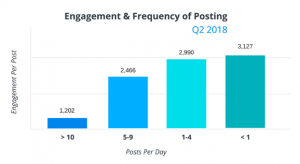— May 10, 2019
Right now, “blockchain” may as well be synonymous with cryptocurrency. In that capacity, blockchain is still a highly effective and arguably revolutionary technology. Yet, the potential applications for blockchain go far beyond Bitcoin and similar forms of money. This may usher in a new era of crowdfunding.
The real power of blockchain is its ability to keep track of exchanges in a way that’s secure, publicly verified, and virtually impossible to use fraudulently. It keeps a record of how ownership changes. This makes it perfect as a platform for creating, distributing, and exchanging currency. Soon, the ownership of other assets may emerge on the blockchain scene.
Notably, the world of crowdfunding could be completely changed thanks to blockchain’s advantages. Crowdfunding has skyrocketed in popularity over the past decade or so. There are more than 375 crowdfunding platforms. North American crowdfunding volume totaled $ 17.2 billion in 2017.
The Limits of Present-Day Crowdfunding
Let’s start by analyzing modern-day crowdfunding pain points. Crowdfunding offers many advantages to creators and consumers. It democratizes the process of investment, whether it’s for a business, an invention, or a work of art. Anyone can contribute as much or as little as they want. Entrepreneurs and inventors who might otherwise struggle to get an audience gain exposure. And, it gives life to new products that might otherwise never see the light of day.
But, there are some flaws with this model:
-
The platform cash-grab.
For starters, every crowdfunding exchange today is dependent on one of several dedicated crowdfunding platforms. These platforms aren’t providing opportunities for people for free or out of the goodness of their heart. They take a fee for every project listed. Sometimes, this is a flat fee while others require a percentage of the total proceeds raised by contributors. Companies and organizations can’t be faulted for trying to make money. However, for inventors whose projects depend upon a critical level of funding, this can be a major thorn in the side.
-
Rules and regulations.
Most platforms serve as gatekeepers for the projects they fund. For example, on Kickstarter, every project must produce some actual thing. It can’t be a new initiative or a service-based business. Projects on Kickstarter also can’t offer equity to micro-investors. They will be removed if they violate any of Kickstarter’s vaguely written terms of service. This gives considerable power to Kickstarter moderators. While this serves as a good filter to cut down on clutter, it also prohibits some people with otherwise amazing ideas from getting their projects the visibility they deserve.
-
The burden of marketing and advertising.
Having a good idea on a crowdfunding platform isn’t a guarantee of success. You need a way to make your crowdfunding page more visible and attract new people to that project. Some crowdfunding platforms have a “featured” section, noting some of the currently most-popular projects. If you never make it to that threshold of popularity, then it’s not going to help you in the slightest. Spending time on branding, pitching, advertising, and strategies like search engine optimization (SEO) is a practical requirement. However, it takes time away from the actual invention or business.
-
Empty promises.
Modern crowdfunders typical contribute money in exchange for a promise. Depending on the contribution level, this could be a copy of the new product when it comes out, a small piece of memorabilia, or something more exciting. Unfortunately, those promises can be broken. Multiple highly popular crowdfunding campaigns have turned out to be scams, and successful ones at that. People never get the products they paid for months ago. Often, they forget about their contributions, so they never end up taking legal recourse.
-
Copyright vulnerability.
Some creators have seen their entire business model collapse before they even got a chance to start production. When their idea got popular on the crowdfunding circuit, other entrepreneurs got inspired and rushed to beat them to market with a nearly similar product. Even with a copyright in place, you might only be giving more ideas and more inspiration to your top competition.
How Blockchain Changes the Crowdfunding Game
So where does blockchain come in? The natural advantages of blockchain technology can support and improve crowdfunding in several distinct areas:
-
Decentralization.
The blockchain is completely decentralized. This means it isn’t going to rely on any platform or combination of platforms to enable creators to raise funds. That’s going to have multiple positive effects for the crowdfunding community. For starters, you’ll no longer be beholden to the rules, regulations, and whims of the most popular crowdfunding platforms on the internet. Literally, any project has a chance of getting visibility and getting funded. It also eliminates the problem of fees. While blockchain upkeep does cost a bit of money, you’ll cut back drastically on transaction fees. This makes crowdfunding less expensive for creators and investors.
-
Accessible equity (or something similar).
Instead of crowdfunding to enable preorders of upcoming tangible products, blockchain could rely on asset tokenization to provide investors with equity or some similar concept of ownership. For example, an inventor who plans on creating multiple new products with the incoming funds could grant each new investor with a small ownership stake in the company, commensurate with the amount they contribute. That way, investors will see success proportional to the eventual success of the company. This could potentially open whole new worlds of investment opportunity.
-
Universal availability.
Any project using a blockchain-based crowdfunding model can potentially get funded. Also, any person with an internet connection can contribute to those projects. There may be some demand for discovery and visibility platforms. But, there isn’t a fundamental limitation the way there is for crowdfunding projects today.
-
Immediate provision.
Blockchain-based crowdfunders wouldn’t have to worry about the “empty promises” that have plagued modern-day crowdfunding projects. Instead of contributing money and waiting weeks or months to receive the promised product they, contributors will immediately receive fractional enterprise or product ownership.
-
Flexible options.
Using the blockchain as asset tokenization grants creators and entrepreneurs more liberties. They can raise more funds by issuing more fractional shares in their enterprise and use those funds to expand. Yet, they can also leverage those fractional shares directly. For example, they could save money on hiring employees by compensating them partially in fractional ownership of the business, converting it into an employee-owned enterprise. Asset tokens become their own form of currency in this model, enabling organizations to do more like hire professionals like marketers and advertisers.
-
Peer to peer exchanges.
Just like cryptocurrency today, it’s possible to exchange crowdfunded business or product stakes on a peer-to-peer basis. This provides contributors with more liquidity for their investments. It could serve as a way to generate more interest in the project overall. This change could eventually precipitate the creation of an entirely new type of marketplace.
Of course, this doesn’t eliminate every problem. Copyright issues may still remain. However, it eliminates or improves the vast majority of them.
Toward a New Era of Crowdfunding
It’s no secret that crowdfunding has enormous potential. Even in its current, flawed form, funding is helping new entrepreneurs, inventors, and creators improve the world. In the near future when the blockchain serves as the backbone of democratized investor contributions, it’s going to be even more accessible, secure, and flexible for creators and investors. It’s only a matter of time though the exact length of time is hard to estimate. There are still some challenges to overcome and only so much blockchain talent to go around.
Business & Finance Articles on Business 2 Community
(118)
Report Post




